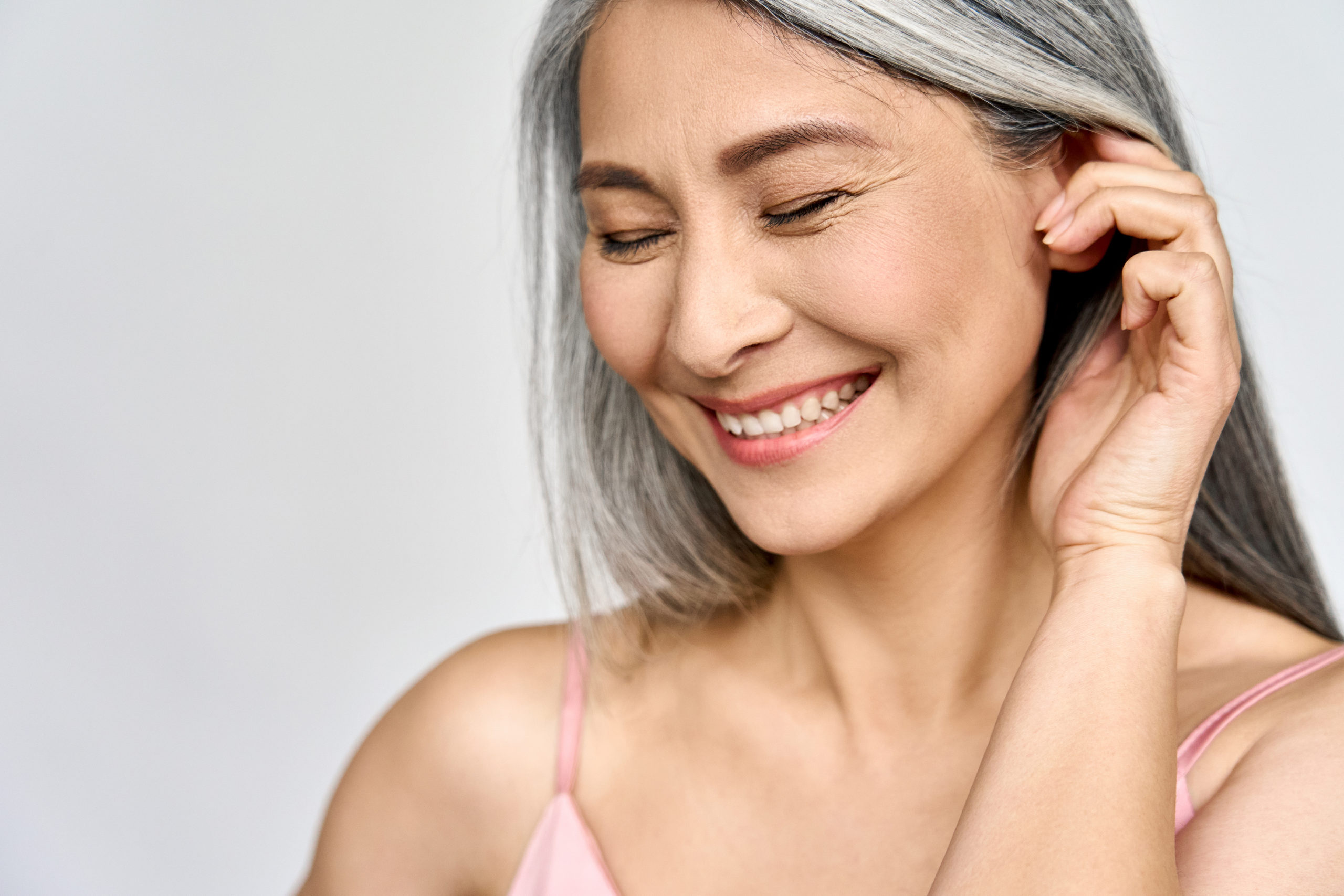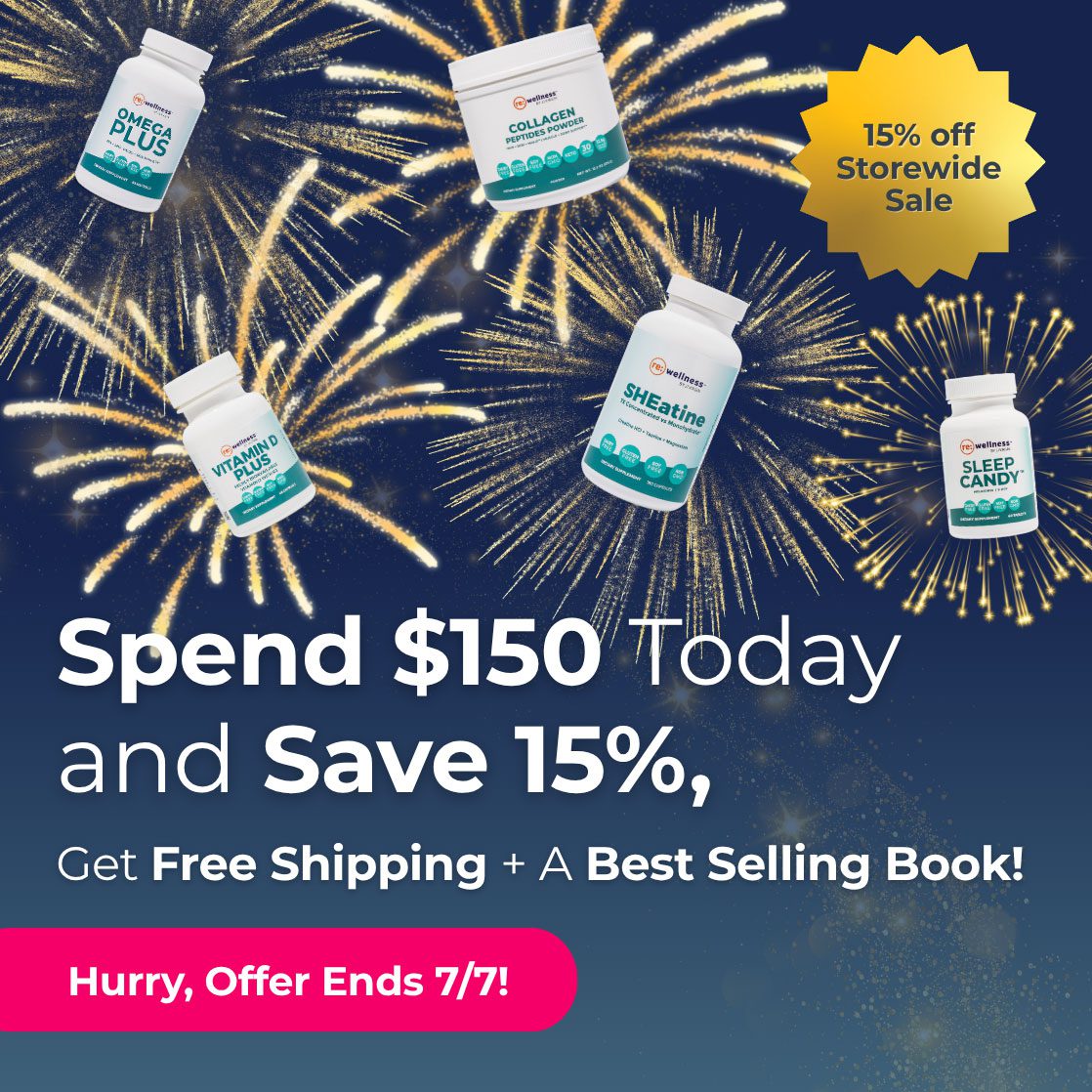If you think menopause means saying goodbye to your sex drive, a healthy weight, and all the pleasures that life brings… I’m about to open up a whole new world for you.
I bet I can guess what picture instantly jumps into your mind: future you with night sweats, mood swings, and weight gain. That’s what we were always told to expect, but I’m living proof you can come out the other side feeling better than ever.
When you hear all that old doomsday garbage lingering from your grandmother’s menopause days, remember that today we have much better scientific evidence guiding us toward a path to move through menopause gracefully. We know the lifestyle choices to make, the right nutrient support to feel great, and other science-proven ways to lose weight and manage menopausal symptoms
Challenging menopause myths
There are a lot of misconceptions around menopause, including identifying what it actually is. Technically, you don’t reach menopause until one year after your last period. The difficult symptoms and hormonal changes that we stereotypically think of as “the transition” actually encompass a phase called perimenopause.
For some women, perimenopause can start as early as in their 30s. However, the obvious signs start when most women are between 40 and 44, and it can last four to eight years.
This whole phase before you go into full-blown menopause is the beginning of some really big changes in your body. You have to be prepared and know how to take care of yourself during this transition so you can feel great and, yes, even lose weight with so much in flux.
Once you’re on the other side, I promise you the biggest challenges are over! Balancing your hormones becomes simpler, because they’re no longer a moving target like they are when you’re in the middle of perimenopause.
While we’re at it, allow me to debunk the myth that metabolism hits a brick wall as soon as you have your last period. New research shows that your metabolism does take a little dip as you get older, but that doesn’t happen until you hit about 60 years old.1
So then why does it seem like it does for so many people? Because most people don’t pay any attention to the preparation required to navigate the hormonal changes that come with menopause.
The best supplements for menopause
Before we dive into which supplements I recommend for helping you through menopause, there’s something important I want you to do: get really clear on what fluctuations in your hormones feel like.
Take the time to tune in to your body. Trust me, understanding what’s happening when you’re going through these changes will help you tremendously. Lab testing is the best way to connect your hormone levels to what you’re feeling (you’ll want to test your sex and thyroid hormones).
These tests can give you a better picture of what’s going on so that you have a more accurate idea of how to create your own personalized wellness plan.
That said, there are a few nutrients I highly recommend for anyone needing support as they go through the phases of menopause.
1. DIM (Di-Indolyl Methane)
DIM supports hormone balance by helping your liver effectively detoxify excess estrogen. This compound also promotes the production of beneficial estrogen metabolites while discouraging harmful ones.2
This helps regulate estrogen dominance, support breast health, and relieve perimenopause symptoms. DIM is also effective at balancing testosterone in women.
You can get DIM from cruciferous veggies like broccoli and brussels sprouts, but you’ll also want to supplement to make sure that you’re getting enough. You may have heard of another compound called I3C (indole-3 carbinol), a detoxifying phytonutrient in cruciferous vegetables. DIM is actually a better-absorbed metabolite of 13C—and if you’re spending on supplements, you’ll want to make sure you actually absorb them!
2. CoQ10
CoQ10 is an antioxidant found in just about every single cell in the body. CoQ10 supports the health and regeneration of mitochondria (which are tiny “energy factories” inside your cells). This can help restore that vibrant, youthful energy you want to take with you into your later years.
CoQ10 is also critical for heart and liver health, and it promotes optimal metabolic function for better fat-burning ability.3 This is especially helpful when you’re navigating the menopausal wild west and weight gain may be an obstacle on your path to the other side.
As an antioxidant, CoQ10 also prevents DNA damage that can lead to symptoms of aging and menopause, and it builds proteins to be used more efficiently throughout the body.4
3. Annatto-E
Annatto is the richest source of tocotrienols, which belong in the vitamin E family. Annatto helps support healthy aging, cellular energy generation, and maintains muscle and bone mass during the aging process.5,6
Annatto also has protective benefits for your brain and heart health, and is especially supportive of blood pressure, cholesterol, and triglyceride metabolism. Annatto is often used to improve menopause symptoms like hot flashes—and trust me, it’s such a relief!7
The annatto plant also contains a compound called geranylgeraniol (GG), which enhances its overall benefits. GG declines naturally as you age, so you’ll want to supplement accordingly for internal CoQ10 production, endogenous CoQ10 absorption, and overall hormone balance.8
GG also supports skeletal health as you age by ensuring calcium is delivered into the bones.
References
- Timothy W. Rhoads,Rozalyn M. Anderson,Taking the long view on metabolism, Science, 373, 6556, (738-739), (2021).
- Grose KR, Bjeldanes LF. Oligomerization of indole-3-carbinol in aqueous acid. Chem Res Toxicol. 1992;5(2):188-193. doi:10.1021/tx00026a007
- Rodick TC, Seibels DR, Babu JR, Huggins KW, Ren G, Mathews ST. Potential role of coenzyme Q10 in health and disease conditions. Nutrition and Dietary Supplements. 2018;10:1-11
- Hernández-Camacho JD, Bernier M, López-Lluch G and Navas P (2018) Coenzyme Q10 Supplementation in Aging and Disease. Front. Physiol. 9:44. doi: 10.3389/fphys.2018.00044
- Chin, K.Y., et al., The Effects of Tocotrienol and Lovastatin Co-Supplementation on Bone Dynamic Histomorphometry and Bone Morphogenetic Protein-2 Expression in Rats with Estrogen Deficiency. Nutrients, 2017. 9(2)
- Shen, C.L., et al., Tocotrienol supplementation suppressed bone resorption and oxidative stress in postmenopausal osteopenic women: a 12-week randomized double-blinded placebo-controlled trial. Osteoporos Int, 2018.
- Ziaei S, Kazemnejad A, Zareai M. The effect of vitamin E on hot flashes in menopausal women. Gynecol Obstet Invest. 2007;64(4):204-207. doi:10.1159/000106491
- Cao P, Hanai J, Tanksale P, Imamura S, Sukhatme VP, Lecker SH. Statin-induced muscle damage and atrogin-1 induction is the result of a geranylgeranylation defect. FASEB J. 2009 Sep;23(9):2844-54. doi: 10.1096/fj.08-128843. Epub 2009 Apr 30. PMID: 19406843; PMCID: PMC2735363.






